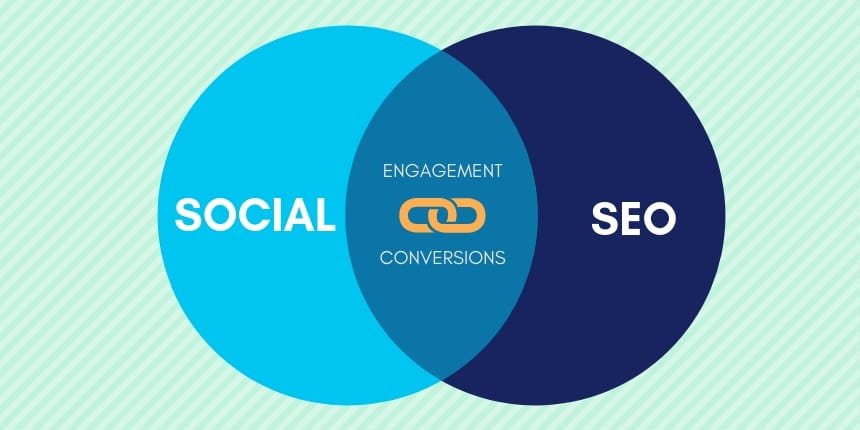The synergy between social media and SEO (Search Engine Optimization) has emerged as a critical factor for businesses aiming to bolster their online presence and visibility. This blog post explores the pivotal role that social media plays in SEO strategies, elucidating how businesses can harness social signals to effectively amplify their SEO endeavors.
1. Social Signals and SEO
Understanding Social Signals
Social signals encompass various metrics and interactions on social media platforms, including likes, shares, comments, and followers. These interactions serve as indicators of a website’s relevance and quality to its audience, influencing search engines when determining rankings.
Impact on Search Engine Rankings
While social signals do not exert a direct influence on search engine rankings, they indirectly affect SEO by offering additional avenues for enhancing online visibility. Social media profiles often feature prominently in search engine results pages (SERPs), and heightened engagement on social platforms can bolster brand awareness and drive traffic to websites, thereby bolstering their search engine rankings.
Optimizing Social Signals for SEO
To optimize social signals for SEO, businesses should prioritize the creation of high-quality, comprehensive content tailored to the needs and interests of their target audience. Expanding keyword research to identify new opportunities and niche markets is also crucial. Additionally, outsourcing certain SEO tasks, such as content creation or link building, to specialized professionals or agencies can streamline processes and maximize efficiency.
Measuring the Impact
Regularly monitoring SEO performance through tools like Google Analytics and Google Search Console is essential for gauging the impact of social signals on SEO. This practice enables businesses to identify areas for improvement and adjust their strategies accordingly.
Debunking Misconceptions
Dispelling misconceptions surrounding social signals and SEO is vital. While social signals may not directly impact search engine rankings, they do signify a website’s relevance and quality to its audience, factors that search engines do consider when ranking websites.
2. Integrating Social Media Strategies
To leverage the potency of social media for SEO, businesses must seamlessly integrate social media strategies into their overarching digital marketing endeavors.
Creating and Optimizing Social Media Profiles
Initiate by crafting and optimizing social media profiles on platforms pertinent to the target audience. Incorporating keywords into profiles and ensuring completeness and currency are essential steps.
Consistently Sharing High-Quality Content
Consistent dissemination of high-quality content that resonates with followers and stimulates engagement is paramount. This content mix can encompass original, curated, and user-generated content.
Utilizing Hashtags Strategically
Strategic utilization of hashtags to broaden reach and attract new followers is advisable. Employing relevant and trending hashtags in posts enhances visibility.
Fostering Relationships with Influencers
Nurturing relationships with influencers and industry leaders can amplify a brand’s presence on social media and increase the likelihood of earning valuable backlinks. Engaging with influencers, collaborating on content, and seeking their endorsement are effective strategies.
3. Measuring Social SEO Impact
Accurately measuring the impact of social media on SEO necessitates tracking relevant metrics and analyzing data comprehensively.
Utilizing Social Media Analytics Tools
Social media analytics tools facilitate monitoring of key metrics such as engagement rate, reach, and referral traffic to websites, offering insights into how social media activity influences SEO performance.
Tracking Changes in Search Engine Rankings
Tracking fluctuations in search engine rankings and organic traffic over time enables assessment of the correlation between social media activity and SEO performance, informing adjustments to strategies.
Leveraging Tools Like Google Analytics
Leveraging tools such as Google Analytics to attribute website conversions and leads to specific social media channels provides invaluable insights into the efficacy of social SEO efforts.
Measuring Social Media Sessions, Bounce Rate, and Pages Per Session
Metrics like social media sessions, bounce rate, pages per session, average session duration, and goal completions offer deeper insights into how social media activity impacts SEO performance.
Optimizing Social Media Profiles and Posts for SEO
Optimizing social media profiles and posts for SEO enhances social media optimization (SMO). Employing keywords, hashtags, tags, descriptions, and multimedia formats that captivate attention and drive clicks is crucial.
Conclusion
In conclusion, social media plays a pivotal role in SEO strategies, furnishing businesses with invaluable opportunities to augment online visibility and drive organic website traffic. By comprehending the nexus between social signals and search engine rankings, businesses can seamlessly integrate social media strategies into their digital marketing efforts, thereby significantly enhancing their online presence and brand awareness.
For expert guidance and support in maximizing the impact of social media on SEO, businesses can engage with experienced SEO consultant offering tailored services to meet their specific objectives. This collaborative approach empowers businesses to stay ahead of the competition and adapt to the dynamic digital landscape.
Recommended by Editor:
